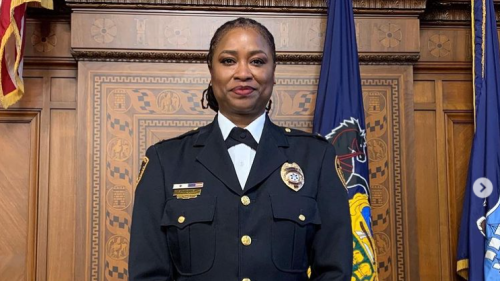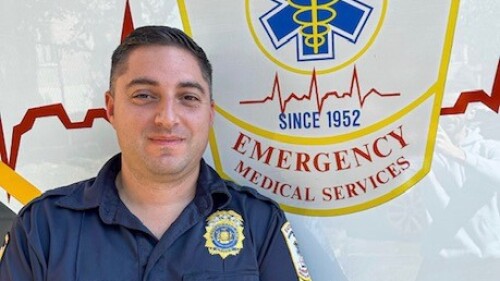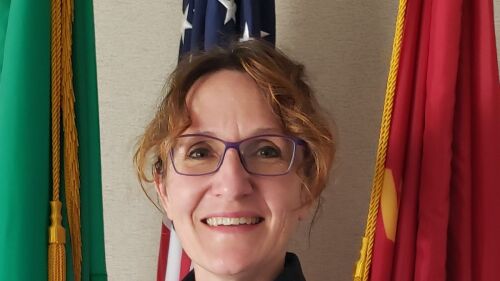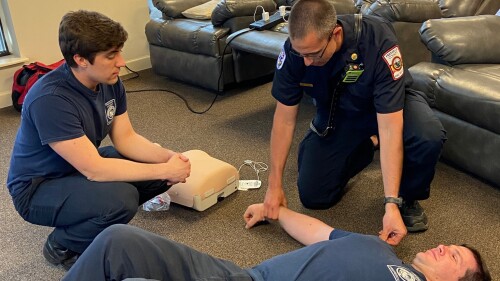The following content is part of EMS1’s EMS Leader Playbook – aimed at helping new EMS leaders increase their effectiveness, enhance their leadership KSAs, develop trust among crewmembers, and build confidence. Through a handful of questions presented by EMS1, veteran chiefs reflect on their early days in leadership roles and offer advice, while newer leaders detail their experiences taking on a new position.
Email editor@ems1.com to offer your insights for the EMS Leader Playbook or to nominate a chief to be featured.
In this installment of Chief Insights, we feature Joel Koehn, a career critical care paramedic and assistant chief of his local volunteer ambulance service.
What was the incident or person in your career that put you on the path to becoming a chief?
I do not recall a certain incident that inspired me to be a leader, and I am still relatively new to EMS – at least when I consider my coworkers’ years of experience.
My journey in emergency services began as a junior firefighter in a small volunteer department. I later earned my Firefighter I and II certifications, and enrolled in EMT training. After completing EMT class, I became a volunteer first responder and took on a part-time role with a local ambulance service. That experience ignited my passion for EMS, and I knew I wanted to pursue it further, so I enrolled in paramedic school. During paramedic school, I worked full-time as an EMT and, once I graduated, began my career as a paramedic – and I haven’t looked back since.
I thrive in the fast-paced and ever-changing environment of EMS. I’m deeply passionate about continuous learning and enjoy teaching others, helping them grow into the best providers they can be. Ever since I started my career in EMS, I have had a passion for education and helping others succeed. After joining the Fayette Ambulance Service, I became a very active member in all aspects of the department, always looking to better myself and inspire others to be the best they can be.
I gained the confidence and trust of the chief, who then appointed me as the new assistant chief, which I graciously accepted and am still serving in this capacity.
What’s something you want to accomplish in your next year as chief?
There are always things I would like to accomplish and changes that could be made to better serve our crew and our community. I am extremely proud of the progress we have been able to make over the past couple of years with the help of our crew. We have been able to update many of our patient care guideline and add new medications to better care for our patients.
I am always looking for ways to improve, but if I could accomplish one thing in the next year, it would be to do a better job recruiting and add more staff.
How do you create an organizational culture that people want to be a part of, to join and to stay?
The culture of any organization is arguably the most important aspect. In either career or volunteer agencies, if you cannot keep a positive culture, you will end up having a rotating door of staff, which will add extra expense and delay progress.
To keep a good culture, first of all, the leadership of the organization must show up with a good attitude and promote the best in everyone in the organization.
How do you support and stand up for your personnel, internally and externally, to show that you care about them as a person and a professional?
Another key to culture is listening to your staff and then acting on what they need. As a leader in any organization, it is important for you to stand up for your staff both in and out of work. If your personnel do not feel like you support them, they will not give their best.
How do you demonstrate servant leadership?
The best way for me to demonstrate servant leadership is to never ask someone do a task that I am unwilling to do. As a leader, no job is below you and you should be getting your hands dirty and helping your personnel. This builds better morale and also gives you a better feel of how your organization is doing.
| More: The 10 commandments of servant leadership
Leadership lightning round
What is a leadership book, podcast or seminar you’ve found invaluable?
Two books that I would recommend if you are a leader or an aspiring leader are, “Fully Involved Leadership,” written by Gary Ludwig; and “Extreme Ownership,” written by Jocko Willink and Leif Babin.
If you knew the budget request would be approved, what’s a big purchase you’d make for your department today?
I would love to add a dedicated EMS UTV to our service for better response in the state park that is in our coverage area.
How do you recharge/improve your resiliency?
One of the ways I like to recharge after a stressful shift or call is to spend some time at the gym to unwind. To remain resilient in your career, you need to spend time away from your job and doing a hobby you enjoy. A 2-week vacation in the Caribbean with your phone off would also help!







